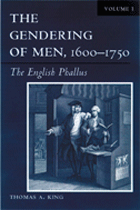 We
can always depend upon Gene Hayworth to tackle scholarly and uncommon
GLBT literature, and this month's review is no different.
We
can always depend upon Gene Hayworth to tackle scholarly and uncommon
GLBT literature, and this month's review is no different.Gene Hayworth reviews Thomas Alan King's
The Gendering of Men, 1600-1750: The English Phallus
Gene Hayworth grew up in North Carolina and attended undergraduate school at UNC - Greensboro. He worked for 10 years as a layout artist, technical writer, computer specialist and training instructor before returning to school at the University of Rochester, where he received a Masters degree in English with a concentration in creative writing, and an MLS from Syracuse University. He moved to Colorado in 1995 and worked at CARL Corporation for several years, and in the summer of 1999 he worked for CARL in Singapore, which resulted in the publication of an article about his experiences titled "Singapore Libraries Usher in a New Era," in Computers in Libraries, 20:6 (Nov./Dec. 2000). He is an avid reader and has written several book reviews for Colorado Libraries. In February 2003 he prepared an exhibit at the Fales Library, NYU, on the Gay American novelist and playwright Coleman Dowell. His critical study of Dowell appeared in The Review of Contemporary Fiction, Fall, 2002. Currently he works as a reference librarian for the University of Colorado at Boulder Libraries.
Gene Hayworth would like to hear from you about this review. If you are a writer or publisher with a literary offering or work of non-fiction, please contact Gene directly with your request for a review.
 The
gendering of men, 1600-1750: The English phallus
The
gendering of men, 1600-1750: The English phallusby Thomas Alan King
University of Wisconsin Press, 2004, 370 pages
0-299-19784-0
The major premise of Thomas King’s analysis, The gendering of men, 1600-1750: The English phallus, concerns the transformation of male and female roles in public and private spaces from those that disregard gender to those that highly prize masculinity and femininity. In the book’s introduction, King considers the historical importance of subjugation to patriarchy and sovereignty in defining public roles, how importance of rank--the proximity to the sovereign body and superiors—determined the understanding of self in relationship to others. According to King, the concept of self was not gendered in the same sense we view it today; the concepts of masculine and feminine only developed as society moved toward a more equitable sense of the private individual King examines the development of modern sexual identity and develops a cogent argument for the “gendering of men”-- the distinct point in time when there is a break from subjugation, allowing men to “possess manly autonomy and authority regardless of the place he occupied…” In large part this break occurred as a result of theater, where gender was easily suspect and changeable.
The gendering of men is a difficult book to read. The following excerpts provide a sample of King’s prose:
Against these mobilities, an alternative social spatialization worked to deny the legitimacy of subjection and to establish a new lateral network of subjectivities, a public sphere of autonomous individuals now able to understand themselves as desiring subjects, complementary to one another in their maleness and femaleness. (61)
The current trend in academic prose is to present such ideas in a more concise, clear style, but King counters this trend, seeming at times to revel too much in concepts like “spatialization” and “mobilities” without grounding those ideas in simple logic. Though it is difficult at times to read, scholars of literature and theater will find much of interest in this work, for King displays a wide knowledge of literature and theater and provides many interesting examples to support his thesis.
Thomas A. King is associate professor of English at Brandeis University. He teaches early modern and eighteenth-century studies, gender and queer studies, and performance studies, and has published articles on gender and sexuality and Restoration and eighteenth-century theater history. The second volume of his study, The gendering of men, 1600-1750: Queer Articulations, is forthcoming from the University of Wisconsin Press.